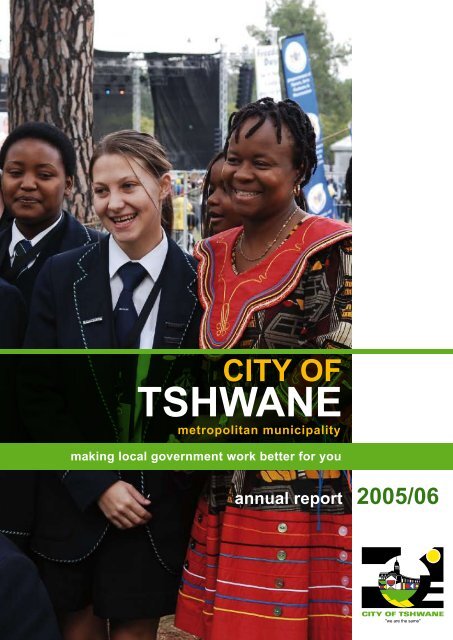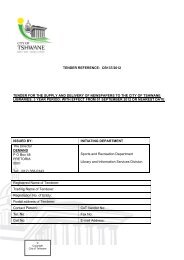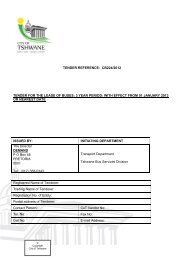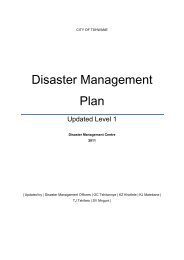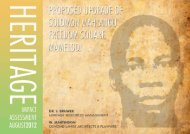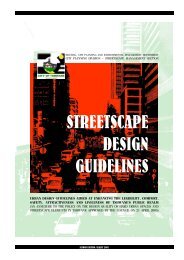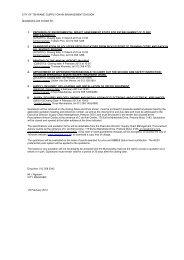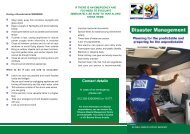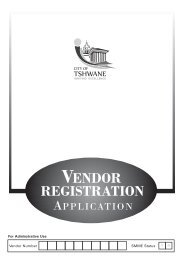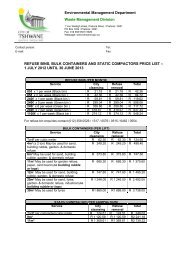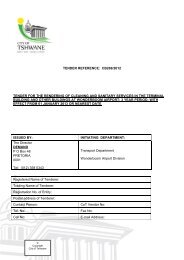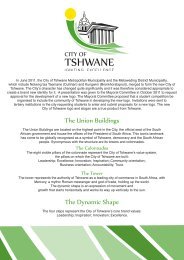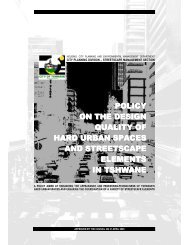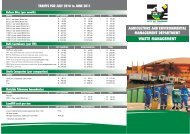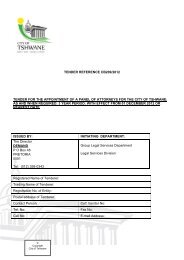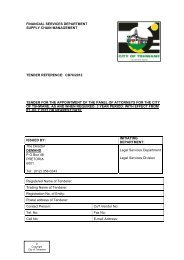AR2005_6chap1 - City of Tshwane Metropolitan Municipality
AR2005_6chap1 - City of Tshwane Metropolitan Municipality
AR2005_6chap1 - City of Tshwane Metropolitan Municipality
You also want an ePaper? Increase the reach of your titles
YUMPU automatically turns print PDFs into web optimized ePapers that Google loves.
CITY OF<br />
TSHWANE<br />
metropolitan municipality<br />
making local government work better for you<br />
annual report 2005/06
city <strong>of</strong><br />
TSHWANE<br />
metropolitan municipality<br />
annual report 2005/06<br />
ISBN - 978-0-620-38290-8
Our vision ...<br />
is for <strong>Tshwane</strong> to be the leading African capital city <strong>of</strong> excellence<br />
that empowers the community to prosper in a safe and<br />
healthy environment.<br />
Our mission ...<br />
is to enhance the quality <strong>of</strong> life <strong>of</strong> all the people in the <strong>City</strong><br />
<strong>of</strong> <strong>Tshwane</strong> through a developmental system <strong>of</strong> local government<br />
and by rendering efficient, effective and affordable<br />
services.<br />
Our value system ...<br />
has been developed to guide each employee on a daily basis<br />
to realise the vision <strong>of</strong> the <strong>City</strong> <strong>of</strong> <strong>Tshwane</strong>. The value<br />
system consists <strong>of</strong> these values:<br />
• Community orientation: Provide and deliver sustainable<br />
services for the whole community based on needs<br />
assessments.<br />
• Transparency: Invite and encourage public sharing and<br />
democratic participation in the <strong>Municipality</strong>’s activities.<br />
• Commitment: Focus and concentrate on the <strong>Municipality</strong>’s<br />
core activities in a consistent manner.<br />
• Business orientation: Subscribe to and comply with the<br />
best business practices.<br />
• Accountability: Report regularly to all stakeholders regarding<br />
the <strong>Municipality</strong>’s performance.<br />
• Integrity: Conduct the <strong>Municipality</strong>’s business in a fair,<br />
responsible, flexible, equitable and honest manner.<br />
• Non-racialism and non-sexism: Promote mutual respect<br />
and non-discriminatory policies and practices.<br />
The strategic focus areas <strong>of</strong> the <strong>City</strong> are based on the manifesto<br />
mandate, which also outlines target dates for the delivery<br />
<strong>of</strong> specific basic services to all residents. These strategic<br />
areas are:<br />
• Providing quality basic services and infrastructure development<br />
with priority being given to communities<br />
in the northern parts <strong>of</strong> the city where there are huge<br />
backlogs, whilst ensuring infrastructure maintenance<br />
in all other parts <strong>of</strong> the city.<br />
• Achieving a higher economic growth rate that is shared<br />
more equitably to ensure that more sustainable jobs<br />
are created and the city is focused on global competitiveness.<br />
• Promoting thriving, sustainable communities jointly<br />
with other stakeholders through programmes that assist<br />
those vulnerable to poverty and ensuring that the<br />
city is clean, healthy and safe.<br />
• Fostering participatory democracy by encouraging<br />
involvement in the day-to-day affairs <strong>of</strong> the city and<br />
observing the principles <strong>of</strong> Batho Pele by providing a<br />
caring, accessible, and accountable service.<br />
• Fast-tracking the transformation <strong>of</strong> the <strong>Municipality</strong> as<br />
an institution so that it promotes good governance and<br />
high ethical standards, sustains financial viability and<br />
ensures that the staff are more representative <strong>of</strong> the<br />
society they serve, and so that capacity to execute<br />
mandates is built in through a performance-based approach.<br />
The above strategic focus areas are guided by the long-term<br />
goals outlined in the <strong>City</strong> Development Strategy. These are to:<br />
• deliver on the manifesto and mandate to improve the<br />
quality <strong>of</strong> life <strong>of</strong> the people <strong>of</strong> <strong>Tshwane</strong> and to make<br />
local government work better;<br />
• ensure continuity and change by building on the successes<br />
<strong>of</strong> the past term and to review and align them<br />
to new strategic objectives;<br />
• achieve state-led development through an effective<br />
intergovernmental relations framework that capitalises<br />
on available resources to optimise capacity;<br />
• foster sustainable integrated development focusing on<br />
economic, social and environmental priorities;<br />
• provide quality services, implement the Batho Pele<br />
principles and achieve people-centred development;<br />
• build the <strong>City</strong>’s institutional capacity to be efficient,<br />
financially viable and aligned to the constitutional requirements<br />
for transformation;<br />
• ensure good governance that fosters participatory democracy,<br />
transparency, accountability and decisive action<br />
against corruption;<br />
• develop strategic partnerships with civic organisations,<br />
business, labour movements, communities and other<br />
institutions in the city to ensure a common vision;<br />
• use e-governance as a means <strong>of</strong> making government<br />
accessible to the people; and<br />
• capitalise on the capital status <strong>of</strong> the city and the various<br />
relations with other cities locally and internationally.<br />
1
TABLE OF CONTENTS<br />
TABLE OF CONTENTS<br />
CHAPTER 1: INTRODUCTION AND OVERVIEW<br />
Foreword by the Executive Mayor ..................................................................... 4<br />
Executive Review by the Municipal Manager....................................................... 6<br />
Report <strong>of</strong> the Chairperson <strong>of</strong> the Audit Committee<br />
for the 2005/06 financial year.......................................................................... 8<br />
Overview <strong>of</strong> the <strong>Municipality</strong>............................................................................. 10<br />
Executive summary........................................................................................... 14<br />
CHAPTER 2: PERFORMANCE HIGHLIGHTS<br />
2.1 Free basic services............................................................................... 16<br />
2.2 Key successes and challenges............................................................... 17<br />
2.3 Statistics.............................................................................................. 18<br />
CHAPTER 3: HUMAN RESOURCES AND ORGANISATIONAL MANAGEMENT<br />
3.1 Organisational structure....................................................................... 22<br />
3.2 Organogram......................................................................................... 23<br />
3.3 Overview <strong>of</strong> main activities and responsibilities..................................... 24<br />
3.4 Employment equity............................................................................... 26<br />
3.5 Skills development............................................................................... 27<br />
3.6 Performance management.................................................................... 29<br />
3.7 Occupational health and safety............................................................. 30<br />
3.8 Staff information.................................................................................. 31<br />
CHAPTER 4: AUDITED STATEMENTS AND RELATED FINANCIAL INFORMATION<br />
4.1 Auditor-General’s report – financial statements..................................... 36<br />
4.2 Report <strong>of</strong> the Chief Financial Officer –financial statements..................... 40<br />
4.3 Entities ............................................................................................... 53<br />
4.4 Financial statements............................................................................. 54<br />
4.5 Auditor General’s report – performance measurement........................... 152<br />
4.6 Performance management report.......................................................... 158<br />
CHAPTER 5: FUNCTIONAL SERVICE DELIVERY REPORTING<br />
5.1 Housing, <strong>City</strong> Planning and Environmental Management......................... 172<br />
5.2 <strong>Tshwane</strong> <strong>Metropolitan</strong> Police................................................................. 194<br />
5.3 Service Delivery................................................................................... 194<br />
5.4 Energy and Electricity........................................................................... 203<br />
5.5 Finance................................................................................................ 206<br />
5.6 Corporate Services............................................................................... 208<br />
5.7 Economic Development........................................................................ 208<br />
5.8 Social Development.............................................................................. 214<br />
5.9 Emergency Management Services......................................................... 219<br />
The <strong>City</strong> <strong>of</strong> <strong>Tshwane</strong> <strong>Metropolitan</strong> <strong>Municipality</strong> – Annual Report 2005/06<br />
2
CHAPTER 1<br />
INTRODUCTION AND OVERVIEW
Chapter 1<br />
FOREWORD<br />
GROUP ACCOUNTING POLICIES<br />
FOR BY THE EXECUTIVE YEAR ENDED MAYOR 30 JUNE 2006<br />
Dr Gwen Ramokgopa was<br />
inaugurated on 27 May 2006<br />
This annual report concludes the first five years <strong>of</strong> developmental local government in<br />
South Africa within the context <strong>of</strong> a democratic dispensation, which was marked by the<br />
establishment <strong>of</strong> the <strong>City</strong> <strong>of</strong> <strong>Tshwane</strong> in 2000. This report also ushers in a second term <strong>of</strong><br />
local government following the successful municipal elections <strong>of</strong> 1 March 2006. We pay<br />
tribute to the inaugural leadership <strong>of</strong> the <strong>City</strong> for laying a firm foundation for a caring, efficient<br />
and accountable metropolitan municipality that came about through the amalgamation<br />
<strong>of</strong> 14 administrations into a single municipality.<br />
As we deepen our resolve to improve the quality <strong>of</strong> life <strong>of</strong> our people, we are also mindful<br />
that our ability to alleviate poverty, unemployment and underdevelopment requires an<br />
economic growth rate at much higher levels with more people participating and benefiting<br />
from economic growth. It is within this context that the long-term strategic direction <strong>of</strong> the<br />
<strong>City</strong> will remain on course as we meet our commitment over the next five years to ensuring<br />
that we fast-track the programme <strong>of</strong> providing basic services such as water and electricity<br />
to all residents, as well as delivering the mega economic infrastructure projects that will<br />
create jobs and attract investment to the city.<br />
This report indicates that, in addition to serving existing residents with various municipal<br />
services, 41 048 <strong>of</strong> our people who were on the waiting list were provided with houses,<br />
367 346 with water, 335 317 with electricity, and a number <strong>of</strong> children, elderly people<br />
and those living with disabilities also benefited from the various targeted social support<br />
programmes. More than 2 000 jobs were created and SMME support programmes were<br />
implemented. The city contributed 5,1% to the overall estimated economic growth rate<br />
– an increase <strong>of</strong> 4,8% from the previous year.<br />
We have recommitted ourselves to working in a much more focused way in the next financial<br />
year to increase the number <strong>of</strong> households that receive these essential services,<br />
as we continue to expand the number <strong>of</strong> households that receive free basic water and<br />
electricity.<br />
The <strong>City</strong> is indeed on track towards improving the quality <strong>of</strong> life <strong>of</strong> residents, contributing to<br />
economic growth, improving the quality and efficiency <strong>of</strong> services, and making local government<br />
work better for all. We acknowledge the contribution <strong>of</strong> all councillors, management,<br />
other employees, business and civil society. These achievements and successes<br />
serve as a good foundation to build on and address the challenges that remain.<br />
The task <strong>of</strong> addressing the challenges <strong>of</strong> inequality and poverty cannot be the responsibility<br />
<strong>of</strong> government alone. There is a need for concerted action by the whole <strong>of</strong> the community<br />
<strong>of</strong> <strong>Tshwane</strong>, and hence the need to prioritise all initiatives aimed at strengthening<br />
the ward committee system and enable all other community-based organisations to hold<br />
government accountable.<br />
Dr Gwen Ramokgopa<br />
Executive Mayor<br />
4<br />
The <strong>City</strong> <strong>of</strong> <strong>Tshwane</strong> <strong>Metropolitan</strong> <strong>Municipality</strong> – Annual Report 2005/06
Chapter 1<br />
EXECUTIVE REVIEW<br />
BY THE MUNICIPAL MANAGER<br />
Mr Nava Pillay<br />
Acting Municipal Manager<br />
The <strong>City</strong> <strong>of</strong> <strong>Tshwane</strong> has come a long way in developing a common identity since the establishment<br />
five years ago <strong>of</strong> an integrated metropolitan municipality committed to the principles <strong>of</strong> our<br />
new democracy. The period under review was characterised by a number <strong>of</strong> milestones, not<br />
only for the <strong>Municipality</strong>, but for the city and country as well.<br />
With the inauguration <strong>of</strong> Dr Gwen Ramokgopa as the Executive Mayor on 27 May 2006, the<br />
people <strong>of</strong> <strong>Tshwane</strong> unequivocally confirmed their trust in the governing party to deal with poverty,<br />
unemployment and underdevelopment. As we celebrated the 50th anniversary <strong>of</strong> the<br />
women’s march to the Union Buildings, the women <strong>of</strong> the city and the country expressed their<br />
confidence in the current dispensation to assist them in the struggle for emancipation and empowerment;<br />
while the youth <strong>of</strong> the country, celebrating the 30th anniversary <strong>of</strong> the 1976 student<br />
struggles against the injustices <strong>of</strong> the past, reaffirmed their support for the party and its ability<br />
to honour their basic human rights.<br />
The <strong>City</strong>’s commitment to achieving accelerated shared growth and prosperity is aimed, among<br />
other things, at ensuring a more balanced sharing <strong>of</strong> the benefits <strong>of</strong> economic growth by addressing<br />
the disparities between the first and second economies. The overarching challenge<br />
and priority is to develop and grow a sustainable economy through collaboration with business,<br />
labour, civil society and the education sector.<br />
A large percentage <strong>of</strong> the <strong>Municipality</strong>’s capital budget for 2005/06 was therefore allocated to<br />
the provision <strong>of</strong> infrastructure and basic services. Important priorities were the allocation <strong>of</strong><br />
R10 million towards the establishment <strong>of</strong> the <strong>Tshwane</strong> Economic Development Agency, as well<br />
as R33 million for the development <strong>of</strong> the city’s economic growth infrastructure. Through these<br />
initiatives, among others, the <strong>City</strong> is confident that it can unlock <strong>Tshwane</strong>’s potential to make a<br />
significant contribution to job creation.<br />
The performance <strong>of</strong> the <strong>Municipality</strong> during the period under review was influenced by the developmental<br />
challenges and opportunities it faced in its effort to enhance the quality <strong>of</strong> life <strong>of</strong> all<br />
people in the city. The performance highlights and functional service delivery reports contained<br />
in this document reflect these successes and achievements.<br />
May we continue to enhance the quality <strong>of</strong> life <strong>of</strong> all people in the <strong>City</strong> <strong>of</strong> <strong>Tshwane</strong> through increased<br />
service delivery in the years to come.<br />
In conclusion, the <strong>City</strong> is well prepared and, in partnership with other spheres <strong>of</strong> government,<br />
the private sector and civil society, it has the necessary resources to ensure that the 2010 World<br />
Cup is a success. We look forward to welcoming the peoples world as they visit and enjoy their<br />
time in the capital. In this regard, we are proud <strong>of</strong> our past achievements and are confident <strong>of</strong><br />
our future endeavours to create a sustainable and liveable city for all our residents.<br />
Mr Nava Pillay<br />
Acting Municipal Manager<br />
6<br />
The <strong>City</strong> <strong>of</strong> <strong>Tshwane</strong> <strong>Metropolitan</strong> <strong>Municipality</strong> – Annual Report 2005/06
Chapter 1<br />
REPORT OF THE CHAIRPERSON<br />
<strong>of</strong> the Audit Committee for the 2005/06 financial year<br />
We are pleased to present our report for the financial year<br />
ended 30 June 2006.<br />
Members <strong>of</strong> the Audit Committee:<br />
Ms T Moja (Chairperson)<br />
Ms K Rapoo<br />
Mr K Scheepers<br />
Mr P Ngaki<br />
Ms J Huntley<br />
Ms SV Bvuma (Resigned)<br />
The Audit Committee was established in May 2001.<br />
Attendance <strong>of</strong> meetings<br />
The Local Government: Municipal Finance Management<br />
Act, 2003 (Act 56 <strong>of</strong> 2003), requires that the Audit Committee<br />
meet at least four times a year. During the financial year<br />
under review, five meetings were held to discuss matters relating<br />
to risk management, internal control, the governance<br />
process and the financial statements.<br />
The attendance record for members <strong>of</strong> the Committee is as<br />
follows for the 2005/06 financial year:<br />
Member<br />
Number <strong>of</strong> meetings held<br />
Number <strong>of</strong> meetings attended<br />
during the financial year<br />
during the financial year<br />
Ms T Moja (Chairperson) 5 5<br />
Ms K Rapoo 5 4<br />
Ms J Huntley 5 1<br />
Mr P Ngaki 5 3<br />
Mr K Scheepers 5 3<br />
Ms SV Bvuma (Resigned) 5 3<br />
Responsibilities <strong>of</strong> the Audit Committee<br />
The Audit Committee has fulfilled its responsibilities as stipulated<br />
in the Municipal Finance Management Act. The Committee<br />
adopted an appropriate formal charter, which regulated<br />
its affairs. It has also discharged its responsibilities in<br />
compliance with the approved audit charter.<br />
Effectiveness <strong>of</strong> internal control<br />
The system <strong>of</strong> internal control is designed to provide a costeffective<br />
assurance that assets are safeguarded and liabilities<br />
and working capital are effectively managed.<br />
In terms <strong>of</strong> the provisions <strong>of</strong> the Municipal Finance Management<br />
Act regarding corporate governance, Internal Audit<br />
should provide the Audit Committee and the <strong>Municipality</strong>’s<br />
management with the assurance that internal controls are<br />
adequate and effective to mitigate the risks applicable to the<br />
<strong>Municipality</strong>. This was achieved by means <strong>of</strong> the risk management<br />
process, as well as the identification <strong>of</strong> corrective<br />
actions and the proposal <strong>of</strong> improvements to controls and<br />
processes through internal audit reports.<br />
In order to enhance the risk management process <strong>of</strong> the<br />
<strong>Municipality</strong>, a Manager: Risk Management has been appointed.<br />
8<br />
The <strong>City</strong> <strong>of</strong> <strong>Tshwane</strong> <strong>Metropolitan</strong> <strong>Municipality</strong> – Annual Report 2005/06
In the conduct <strong>of</strong> its duties, the Audit Committee has, among<br />
other things, reviewed the following:<br />
• The independence and objectivity <strong>of</strong> both the internal<br />
and the external auditors<br />
• The operational effectiveness <strong>of</strong> the Internal Audit Unit<br />
and the adequacy <strong>of</strong> the Internal Audit coverage plan<br />
• The operational effectiveness <strong>of</strong> the internal controls,<br />
risk management and the governance process<br />
• The procedure for identifying business risks and managing<br />
their impact on the <strong>Municipality</strong>'s strategic objectives<br />
• The risk areas <strong>of</strong> municipal operations covered in the<br />
scope <strong>of</strong> internal and external audits<br />
• Coordination with the external auditors, the reports <strong>of</strong><br />
significant investigations and the responses <strong>of</strong> management<br />
to specific recommendations<br />
Furthermore, the Audit Committee was committed to reviewing<br />
on an ongoing basis the actions taken by management<br />
to deal with matters reported by both the external and internal<br />
auditors.<br />
Evaluation <strong>of</strong> the financial statements<br />
for the year ended 30 June 2006<br />
The Audit Committee has:<br />
• reviewed significant adjustments resulting from the audit;<br />
• discussed the audited annual financial statements with<br />
the external auditors and the Municipal Manager; and<br />
• reviewed the external auditors' management letter and<br />
management's response.<br />
In addition, the Audit Committee will be evaluating the annual<br />
report for the year ended 30 June 2006 in accordance<br />
with the requirements <strong>of</strong> the Municipal Finance Management<br />
Act.<br />
Ms T Moja<br />
Chairperson <strong>of</strong> the Audit Committee<br />
9
Chapter 1<br />
OVERVIEW<br />
OF THE MUNICIPALITY<br />
The <strong>City</strong> <strong>of</strong> <strong>Tshwane</strong> <strong>Metropolitan</strong> <strong>Municipality</strong> has been<br />
classified as a category A, grade 6 urban municipality by the<br />
Municipal Demarcation Board in terms <strong>of</strong> section 4 <strong>of</strong> the<br />
Local Government: Municipal Structures Act, 1998. It was<br />
established on 5 December 2000 through the integration <strong>of</strong><br />
various municipal administrations and councils.<br />
The new municipality was formed through the amalgamation<br />
<strong>of</strong> the following local authorities:<br />
• The Greater Pretoria <strong>Metropolitan</strong> Council<br />
• The <strong>City</strong> Council <strong>of</strong> Pretoria<br />
• The Town Council <strong>of</strong> Centurion<br />
• The Northern Pretoria <strong>Metropolitan</strong> Substructure<br />
• The Hammanskraal Local Area Committee<br />
• The Eastern Gauteng Services Council<br />
• The Pienaarsrivier Transitional Representative Council<br />
• The Crocodile River Transitional Council<br />
• The Western Gauteng Services Council<br />
• The Winterveldt Transitional Representative Council<br />
• The Temba Transitional Representative Council<br />
• The Mabopane Transitional Representative Council<br />
• The Ga-Rankuwa Transitional Representative Council<br />
• The Eastern District Council.<br />
The <strong>City</strong> <strong>of</strong> <strong>Tshwane</strong> covers an extensive municipal area<br />
<strong>of</strong> 3 200 km 2 , stretching almost 60 km east-west and 70 km<br />
north-south. It is inhabited by about 2,2 million people.<br />
The <strong>Municipality</strong> combined a mayoral executive system with<br />
a ward participatory system in accordance with section 2(g)<br />
<strong>of</strong> the Gauteng Types <strong>of</strong> <strong>Municipality</strong> Act, 2000, and section<br />
2(1)(c)(vii) <strong>of</strong> the North-West Municipal Structures Act,<br />
2000.<br />
During the period under review, the city was governed by<br />
two executive mayors. The term <strong>of</strong> <strong>of</strong>fice <strong>of</strong> Father Smangaliso<br />
Mkhatshwa, who was appointed in December 2000,<br />
expired at the end <strong>of</strong> February 2006. He was succeeded by<br />
Dr Gwen Ramokgopa, who took <strong>of</strong>fice as executive mayor in<br />
March 2006, following the municipal elections.<br />
After the March 2006 local government elections, the <strong>City</strong><br />
<strong>of</strong> <strong>Tshwane</strong> was no longer regarded as a cross-boundary<br />
municipality. This constitutional amendment has assisted<br />
in streamlining intergovernmental relations ins<strong>of</strong>ar as planning,<br />
budgeting and the legislative framework between the<br />
spheres <strong>of</strong> government are concerned.<br />
Notwithstanding the above, for the period under review, new<br />
ward delimitation took place and the number <strong>of</strong> elected representatives<br />
per political party also changed as follows:<br />
10<br />
POLITICAL REPRESENTATION FOR THE PERIOD ENDING 28 FEBRUARY 2006<br />
POLITICAL PARTY<br />
WARD SEATS<br />
The <strong>City</strong> <strong>of</strong> <strong>Tshwane</strong> <strong>Metropolitan</strong> <strong>Municipality</strong> – Annual Report 2005/06<br />
PROPORTIONAL<br />
REPRESENTATION<br />
ACDP 0 2 2<br />
ANC 50* 43 93<br />
ASCORA 0 1 1<br />
DA 23* 24 47<br />
ID 0 1 1<br />
IFP 0 1 1<br />
CDP 0 1 1<br />
PAC 0 1 1<br />
UCDP 0 2 2<br />
TOTAL<br />
FF + 1 0 1<br />
INDEPENDENT<br />
2 0 2<br />
COUNCILLORS<br />
TOTALS 76 76 152<br />
* Vacancies<br />
Vacancies occurred in the following wards:<br />
Wards 18 and 51 – ANC; and Wards 52 and 54 – DA. These vacancies were not filled due to the upcoming elections in<br />
March 2006.
POLITICAL REPRESENTATION FOR THE PERIOD STARTING 1 MARCH 2006<br />
POLITICAL PARTY<br />
WARD SEATS<br />
PROPORTIONAL<br />
REPRESENTATION<br />
TOTAL<br />
ACA 0 1 1<br />
ACDP 0 3 3<br />
ANC 52 35 87<br />
AZAPO 0 1 1<br />
DA 24 23 47<br />
ID 0 1 1<br />
IFP 0 1 1<br />
CDP 0 1 1<br />
NADECO 0* 0 0<br />
PAC 0 2 2<br />
UCDP 0 1 1<br />
FF + 0 7 7<br />
TOTALS 76 76 152<br />
* NADECO’s representation in the Council was withdrawn after an appeal from the CDP which was effected in April 2006.<br />
Shortly after the municipal elections in March 2006, the Executive Mayor announced the ten-member Mayoral Committee and<br />
their respective portfolios, which are as follows:<br />
MEMBER OF THE MAYORAL<br />
COMMITTEE<br />
S Pillay<br />
T Ernest<br />
AM Ditshoke<br />
P Chueu<br />
KC Kekana<br />
S Thipe<br />
SS Dlamini<br />
Z Masondo<br />
BW Mahlangu<br />
A de Klerk<br />
PORTFOLIO *<br />
Roads, Stormwater and Public Transport<br />
Economic Development, Tourism, Airports, Marketing and Communication<br />
Inner-<strong>City</strong> Regeneration<br />
Housing, <strong>City</strong> Development and Environmental Management<br />
Corporate and Legal Services<br />
Energy and Electricity<br />
Water and Sanitation<br />
Health and Social Development<br />
Community Safety<br />
Finance and Audit<br />
* The portfolios were subsequently realigned as reflected on page 13.<br />
Councillor K Dau was elected the Speaker <strong>of</strong> the Council, and Councillor T Komane was elected the Chief Whip <strong>of</strong> Council.<br />
11
Chapter 1<br />
OVERVIEW<br />
OF THE MUNICIPALITY<br />
Five-year strategic programme<br />
The Executive Mayor, Dr Ramokgopa, as instructed by legislation,<br />
ensured that the <strong>Municipality</strong> sprang into action with<br />
the launch <strong>of</strong> the <strong>City</strong>’s five-year strategic programme: a<br />
plan to make the local government work better for all.<br />
Furthermore, a comprehensive review <strong>of</strong> the <strong>City</strong>’s current<br />
service delivery mechanisms was carried out so that it could<br />
develop an alternative service delivery model that would fully<br />
support the <strong>City</strong> Development Strategy and the five-year<br />
strategic programme (IDP) for the <strong>City</strong>.<br />
The Alternative Service Delivery (ASD) programme has been<br />
undertaken in an effort to transform the <strong>Municipality</strong> to deliver<br />
service in an integrated manner. With this programme,<br />
the <strong>City</strong> will be able to orientate itself to a greater community<br />
focus through a regional model to facilitate customer-centric<br />
service delivery and to re-engineer its business architecture<br />
towards being more efficient.<br />
The five regional structures will make participation by our<br />
people even stronger, bringing local government even<br />
closer to the people. Municipal services will be even more<br />
accessible to all residents and will generally be more<br />
responsive to the developmental needs <strong>of</strong> the region.<br />
On the basis <strong>of</strong> the new regional demarcation, each region<br />
will be managed by a regional head. The regions will be responsible<br />
for the decentralised execution <strong>of</strong> core municipal<br />
functions, such as:<br />
• Regional planning, strategy implementation and monitoring<br />
• Housing<br />
• Health and social development<br />
• Sport, recreation, arts and culture<br />
• Environmental management<br />
• Customer care<br />
Included in each region are structures for councillor and<br />
ward committee support and structures for corporate support<br />
services.<br />
The <strong>City</strong> <strong>of</strong> <strong>Tshwane</strong> also controls a number <strong>of</strong> municipal<br />
entities that contribute to achieving the <strong>Municipality</strong>’s objectives<br />
in respect <strong>of</strong> these core functions.<br />
The ASD programme was initiated in December 2004 and<br />
will be undertaken in the following five stages:<br />
• Phase 1:<br />
• Phase 2:<br />
• Phase 3:<br />
• Phase 4:<br />
• Phase 5:<br />
Developing a potential case for change<br />
Developing an institutional reform<br />
strategy<br />
Developing an implementation solution<br />
Implementing the institutional model<br />
Stabilising change and implementing<br />
continuous improvement<br />
Experience has demonstrated that, to successfully implement<br />
a project <strong>of</strong> this magnitude, a phased approach should<br />
be adopted. It was therefore resolved that a dedicated programme<br />
manager be appointed and, in consultation with the<br />
acting Municipal Manager, key personnel will be co-opted to<br />
the ASD Programme Management Office.<br />
12<br />
The <strong>City</strong> <strong>of</strong> <strong>Tshwane</strong> <strong>Metropolitan</strong> <strong>Municipality</strong> – Annual Report 2005/06
Dr G M Ramokgopa<br />
Executive Mayor<br />
Clr K Dau<br />
Speaker<br />
Clr T Komane<br />
Chief Whip <strong>of</strong> Council<br />
Clr A M Ditshoke<br />
MMC for <strong>City</strong> Planning<br />
and Development<br />
Clr C K Kekana<br />
MMC for Community<br />
Safety<br />
Dr A de Klerk<br />
MMC for Corporate<br />
Services<br />
Clr T Ernest<br />
Clr Z Masondo<br />
Clr S Pillay<br />
Clr S S Dlamini<br />
Clr S Thipe<br />
Clr P Chueu<br />
Clr W B Mahlangu<br />
MMC for Agriculture<br />
MMC for Arts,<br />
MMC for Public<br />
MMC for Housing<br />
MMC for Health<br />
MMC for Economic<br />
MMC for<br />
and Environmental<br />
Culture, Heritage<br />
Works and<br />
and Social<br />
Development<br />
Finance<br />
Management<br />
Sports and<br />
Infrastructure<br />
Development<br />
Recreation<br />
Development<br />
13
Chapter 1<br />
EXECUTIVE SUMMARY<br />
In view <strong>of</strong> its strategic priorities, the activities <strong>of</strong> the <strong>City</strong> during<br />
the period under review were focused on the provision<br />
<strong>of</strong> basic services; the progressive redressing <strong>of</strong> backlogs in<br />
infrastructure; job creation, and the enhancement <strong>of</strong> service<br />
delivery and financial management capacity.<br />
The 2005/06 medium-term budget sought to address development<br />
and transformation challenges by deliberately<br />
and purposefully directing resources to the key priorities <strong>of</strong><br />
the <strong>Municipality</strong>. This included additional resources for economic<br />
development, safety and security, and infrastructure<br />
development.<br />
In order to align the strategies to the national and provincial<br />
governments’ growth strategies, the <strong>Municipality</strong> developed<br />
a comprehensive <strong>City</strong> Development Strategy, which formed<br />
the basis for resource allocations in the 2005/06 financial<br />
year and which was further underlined by the five-year strategic<br />
programme (IDP). Financial sustainability and viability<br />
remained the key principles, while the development <strong>of</strong><br />
a long-term financial strategy ensured compliance with the<br />
Municipal Finance Management Act. This strategy set clear<br />
targets in terms <strong>of</strong> tariffs, employee-related costs, repairs<br />
and maintenance, capital expenditure levels and revenue<br />
collection for the next ten years.<br />
The <strong>Municipality</strong>’s priorities for 2005/06 included managing<br />
and developing its infrastructure; developing the economy;<br />
ensuring community safety; building and sustaining communities;<br />
developing and enhancing natural resources; building<br />
the institution and ensuring good governance; and enhancing<br />
<strong>Tshwane</strong>’s image as the capital city.<br />
A highlight for the period under review was the development<br />
and implementation <strong>of</strong> a performance management system<br />
in accordance with legislative requirements and good<br />
business practices. The balanced scorecard model <strong>of</strong><br />
performance management that was adopted by the <strong>City</strong><br />
<strong>of</strong> <strong>Tshwane</strong> aimed to measure the performance <strong>of</strong> the<br />
<strong>Municipality</strong> based on four perspectives: the customer,<br />
internal processes, financial control, and learning and<br />
growth. By means <strong>of</strong> this model, it was possible to manage<br />
and monitor service delivery progress against the identified<br />
strategic objectives and priorities, both at an organisational<br />
and individual level.<br />
14<br />
The <strong>City</strong> <strong>of</strong> <strong>Tshwane</strong> <strong>Metropolitan</strong> <strong>Municipality</strong> – Annual Report 2005/06


